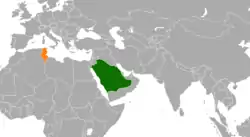Saudi Arabia–Tunisia relations
Saudi Arabia–Tunisia relations refers to the bilateral relations between Saudi Arabia and Tunisia.
 | |
Saudi Arabia |
Tunisia |
|---|---|
Two countries share historical commons, as both are majority Sunni Muslims and their Arabic cultural heritages. Despite of this, Saudi Arabia and Tunisia nonetheless have political differences. Saudi Arabia is a conservative Kingdom while Tunisia is a liberal Republic. However, two countries have engaged in larger cooperations in order to exert Saudi influence.
Saudi Arabia has en embassy in Tunis, whilst Tunisia maintains embassy in Riyadh and a consulate in Jeddah.
Historical
The Arab conquest at 7th century had brought Tunisia into an Islamic sphere. A mosque, which is regarded as the fourth holiest place in the Islamic world, the Great Mosque of Kairouan, was built in Tunisia.[1]
Modern relations
Both two nations have increased significant cooperation since the independence of Tunisia from France. The Saudi Kingdom has attempted to increase their Islamic doctrine into Tunisia for several years recently.[2]
After the Tunisian Revolution in 2011, which ousted President Zine El Abidine Ben Ali, Saudi Arabia has granted asylum for Zine Ben Ali, who himself is a long time friend for the Saudis,[3] while supports Tunisia on their track of recovery. Nonetheless, new Tunisian Government has shown unhappiness towards Saudi Arabia's decision to grant Ben Ali's asylum and has demanded the Saudi Government to extradite back to Tunisia for trials.[4]
However, Tunisia's relations with Saudi Arabia started to get strained with the ascend of Mohammed Bin Salman as Saudi Crown Prince, as Saudi Arabia was hostile toward the Arab Spring, which started in Tunisia. In November 2018, on a trip to Tunisia, Mohammed Bin Salman was greeted by protests from locals in the wake of the murder of Jamal Khashoggi.[5]
In 2019 and in the framework of the Arab League summit, King Salman bin Abdulaziz visited Tunisia as a response to the invitation of President Essebsi.[6]
References
- Sacred Destinations
- "Tunisian PM sacks minister over criticism of Saudi Arabian Islam". Reuters. November 4, 2016.
- "Flight of the dictator: The pilot who flew Tunisia's Ben Ali into exile". Middle East eye.
- "Tunisia demands Ben Ali's extradition from Saudi Arabia". The National. February 22, 2011.
- https://www.theguardian.com/world/2018/nov/27/khashoggi-killing-saudi-prince-greeted-with-tunisia-protests
- "King Salman received by President Essebsi on arrival in Tunisia for official visit". Arab News. 2019-03-28. Retrieved 2019-03-28.

